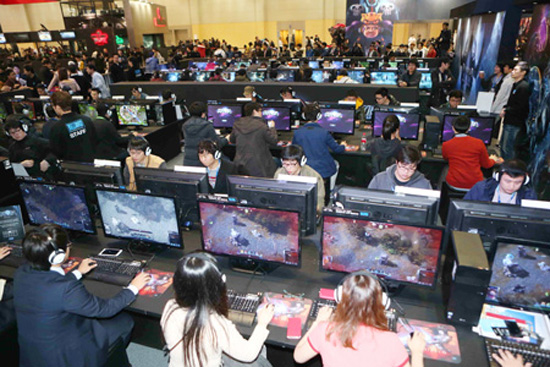- California Assembly OKs highest minimum wage in nation
- S. Korea unveils first graphic cigarette warnings
- US joins with South Korea, Japan in bid to deter North Korea
- LPGA golfer Chun In-gee finally back in action
- S. Korea won’t be top seed in final World Cup qualification round
- US men’s soccer misses 2nd straight Olympics
- US back on track in qualifying with 4-0 win over Guatemala
- High-intensity workout injuries spawn cottage industry
- CDC expands range of Zika mosquitoes into parts of Northeast
- Who knew? ‘The Walking Dead’ is helping families connect
A dangerous path
Does the government want to control games or the Internet?

Visitors try the latest online games at the G-Star computer and games trade show in Busan earlier this month. (Yonhap)
By Kim Tong-hyung

Saenuri Party’s Shin Eui-jin, a doctor-turned-lawmaker, is pushing for a controversial anti-addiction law that groups video games with activities such as drinking, drugs and gambling.
(Korea Times)
President Park Geun-hye’s party has been speechifying about tighter controls on video gaming habits. Prod a little more into its draft laws, however, and one may wonder whether the conservative lawmakers are deliberately drumming up the game issue to mask a renewed attempt at imposing rules on Internet users at large.
It was Park’s predecessor Lee Myung-bak, also a Saenuri Party product, who sought to curb online anonymity and debate after bloggers kicked him in the teeth for restarting U.S. beef imports, which was then a controversial decision, and his economic policies following the Lehman Brothers collapse.
Lee’s efforts, highlighted by requiring website users to make verifiable real-name registrations to leave comments and the arrest of Internet pundit Park Dae-sung, who had been a frequent government critic, ended in abject failure.
With the Internet moving toward mobile devices such as smartphones powered by Google and Apple and social media services like Facebook and Twitter, it was impossible for Korea-only laws to stick when much of Korean online activities now took place on American servers.
By the time the Constitutional Court deemed the real-name law as unconstitutional in August last year, it had already lost most of its relevance.
Fast forward to 2013 and right-wing politicians are once again pushing a set of laws that critics say run against the limits of acceptability. The target this time is online games, which are played on servers instead of consoles and represent one of the fastest growing industries in Korea Inc.
The Saenuri Party’s Shin Eui-jin, a doctor-turned-lawmaker, claims that games are as pathologically addictive as alcohol, drugs and gambling. She groups these behaviors as the main targets for her proposed National Addiction Control Committee, which she recommends as a unit of the Prime Minister’s Office, but which acts as a lobby.
Shin has also signed up for a pair of draft laws submitted by her colleague Sohn In-chun. One of them calls for the government acquiring the authority to hit game companies with a fine equivalent to 5 percent of their annual revenue if they fail to employ appropriate measures for preventing addiction.
Sohn’s other draft says the minister of gender equality and family should have the power to tax game companies 1 percent of their revenue to fund government projects for combating addiction.
There’s no denying that compulsive gaming and addiction are a problem, but the discussions are still ongoing between medical experts on just how much of a problem they are and whether they are more severe in Korea than in other countries with comparable gaming cultures. And despite all the huffing and puffing, lawmakers such as Shin have failed to explain which kinds of games should be considered more harmful than others and why.
Pointing at games, eyeing the Internet
Could it be that games are just the boogie man conservative politicians are playing with as they look for the next opportunity to exert control over the Internet? That would qualify as a strong accusation, but after reading the language of Shin’s draft law, not entirely an outlandish one.
In defining the type of addictions she aims to target, Shin lists alcohol, narcotics, gambling activities and “Internet games and other media content.”
According to Korea’s Content Industry Promotion Act, “content” is defined as material or information consisting of text, signs, figures, color, voice, audio, image and video and any combination between these elements.
The realm of Shin’s draft law, therefore, extends beyond just games and reaches practically every element of culture, including movies, television, music, cartoons, fashion and licensed content. News stories, Internet search results, blog postings and social media content are included too, roped under the category of “text.”
Shin’s draft also requires government organizations administering the targeted markets to report to the addiction committee a renewed plan for preventing and combating addiction every five years. They will also be required to develop plans for “managing” private companies in their production, distribution and sales of “Internet games and media content.”
The affected government organizations will include the Ministry of Science, ICT and Future Planning, which has already been required to combat “Internet addiction” under the revised Basic National Informatization Act that goes into effect in December. The changes in the renewed framework are highlighted by a provision that requires the ministry to employ comprehensive strategies against Internet addiction and train expert personnel for the job.
So it could be said that, in the new version of the act, the government has already secured the legal grounds for dabbling with online behaviors.
Of course, it would be difficult for the future planning ministry to dramatically influence the nature of Internet use when its main functions are about promoting industries, not regulating them.
Shin’s National Addiction Control Committee, however, just might have the muscle to do so.
A separate draft law by Park Seong-ho, another Saenuri Party lawmaker, adds to the suspicions that the party is aiming at the Internet as a whole instead of just games.
Park is proposing giving the culture minister the authority to tax companies up to 5 percent of their revenue generated from “content distribution” to fund the government efforts to spur the industry’s growth.
“Shin’s addiction law has too many elements that are unconstitutional,” said Yoo Seung-hui, a lawmaker of the opposition Democratic Party.
“The Internet is now a culture and basic platform of life and work. Everything could be categorized as media content, including the information consumed on the Internet and passed through portable terminals like smartphones. To define these as addictive material and claim they should be put under government management is equivalent to saying that the government must have control over the Internet and media.”
Park Kyung-shin, a Korea University law professor, shared Yoo’s concerns that Shin’s proposal presents a threat to civil liberties if enacted in its current form.
“Provision No. 30 of the revised Basic National Informization Act allows the central government and municipalities to operate response centers for preventing and fighting Internet addiction. Detailed conditions and requirements for running such centers could be determined through presidential decrees,” he said.
“The worry is that Shin’s draft law, if going through the National Assembly, could provide a base for justifying other legislative attempts to regulate media content.”
Despite multiple tries, Shin was unreachable for comment.
Running against the limits of acceptability
Games industry officials seem to be at a loss on why their companies have come under pressure from the otherwise business-friendly governing party, which in the first year of Park’s presidency has been easily conflated with the “government” in meaning.
There’s no denying that compulsive gaming warrants concern. But it also feels as if politicians such as Shin are attacking the symptoms vigorously to make up for avoiding the disease.
Games are a rare outlet for students who are thrown into a rat race of exams from a young age under Korea’s severely hierarchical education system. Their unhealthy gaming habits may have more to do with their unhealthy environment than the addictiveness of them games themselves.
It’s hard to imagine that Korean youngsters would be this attached to games if the country had better public infrastructure for sports and leisure. But it’s not that parents would be happier if their kids were playing football and basketball instead of games when these activities are just as irrelevant to test scores, which are definitely the biggest obsession of them all.
The law already prevents gamers under the age of 16 from playing between midnight and 6 a.m., but youngsters seem to find it easy to bypass the restraints.
“Perhaps, the government is tempted to regulate the game industry more than other sectors because the fallout to other industries would be minimal. Games are a rare business where retail, distribution and inventory aren’t concerns,” said Kim Dong-eun, a Seoul-based game developer.
“Policymakers can also have a clearer idea over taxation in games than other businesses because customer payments are processed electronically. And it’s easy for the governments to find support for strengthening regulations on games from the older generation of voters and parents’ groups. It would be hard for under-aged users, who would be affected by such regulations, to match that social influence.”















